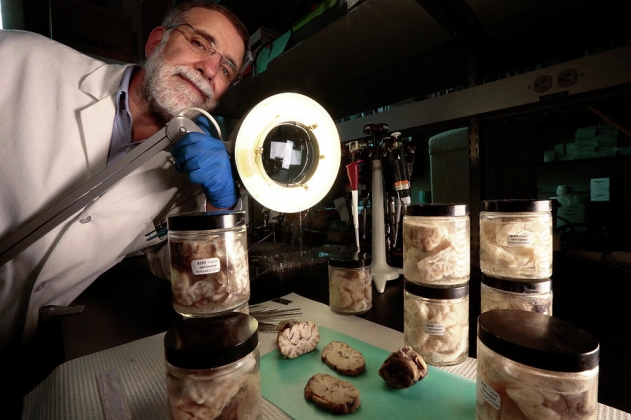
In 2006, Dr. Charles Roselli’s study of the mating selection of rams came became the center of a controversial public debate. Carnegie Mellon graduate Daniel Hirsch was inspired by this story to write the feature film script SHEEPISH, which centers on both the public and private implications for an endocrinologist of his study on male-oriented behavior of rams. Understanding the biochemistry of sexual selection is crucial to understanding evolution. Dr. Roselli worked with Hirsch on the scientific accuracy of the script. In 2017, the script was awarded $15,000 from the Sloan Foundation’s partnership with Carnegie Mellon. Science & Film spoke with Hirsch on the phone after the award announcement.
Science & Film: What can you tell me about SHEEPISH?
Daniel Hirsch: The script is inspired by true events but it is fictionalized. It is the story of a scientist who studies hormones in sheep brains, specifically around sexual selection; more colloquially and scientifically inaccurate in all kinds of ways, he studies “gay sheep.” These are rams that exclusively mount other rams. The story is about how this particular piece of research ignites a huge media firestorm. The Christian right, PETA, celebrities, LGBTQ activists, and even the scientist’s own daughter are protesting the research. His teenage daughter joins the protest because she is in the process of coming out as gay, and he doesn’t realize it until it’s too late. He has to communicate what the research means to him and why it doesn’t have the political implications she thinks it does.
In the script, my character Peter Woolinsky, who sees himself as impartial and objective, thinks that his research could have a progressive impact. Because at the time–the year that the Federal Marriage Amendment banning gay marriage was making its way through Congress with President Bush’s support–the argument that conservatives made was that gay sexuality was unnatural.
S&F: Are you coming at this from a certain angle? Do you think your story has a message?
DH: To me it is a story all about how fraught and difficult it can be to communicate scientific ideas to the public, especially scientific research around sexuality. The hero is the scientist. I was interested in the ways he would have to navigate the treacherous terrain of studying sexuality, and ultimately his results are inconclusive. This underlines how sexuality is very complicated. It’s complicated for sheep, but it’s even more complicated for humans. All the politics around this wrap his research into questions about human sexuality, which is ultimately not what he’s researching and isn’t applicable.
I am queer myself and a long time ago I read an article in The New York Times about a biologist who studies “lesbian” albatross. I thought about how tricky it is for researchers who study animal behavior and sexuality to talk about their research without it being anthropomorphized. That was interesting thinking about how quickly humans want to conflate animal behavior with our own behavior. But as a young person reading that article I thought, there is something natural about queer sexuality. So it had an appeal to me.
S&F: So you were also anthropomorphizing it.
DH: Yeah, totally.

S&F: To write the script, have you just been drawing from what is in the public record?
DH: I actually talked with the scientist, Charles Roselli, who the story is based on. He was a consultant on the script. I fictionalized a lot of things in my screenplay. He said that I could use the story as long as the science is accurate. I feel very lucky for his willingness to let me take some of the things that happened to him and some of his research and run with it.
S&F: How did you get in touch with him?
DH: I just reached out. I told him that this was for a screenwriting competition and I didn’t know what would come of it, but asked if he was willing. He said that as long as the science is accurate it is okay.
S&F: Were you thinking of writing this story before you heard about the Sloan prize, or was that an incentive?
DH: I’ve always thought about doing something about “gay animals” and the frequently absurd political frenzy that can surround the research, like that controversy around the “gay penguins” in the Central Park Zoo from a couple of years ago. I felt like this would be a really good Sloan script because to me, the script is about the mission of the Sloan Foundation, and the challenge of communicating scientific ideas to the public. The scientist at the core of it is defending his research and defending the scientific method from all these people who would politicize it or accuse him of bias.
Studying hormones is very dicey. The fear from LGBTQ rights groups is if you study a hormone that correlates with same sex mating behavior in animals, then there is a possibility of creating a cure for being gay, of identifying a “gay gene.” That’s not what the sheep research featured in my screenplay is about, but I can sympathize with this perception.
Daniel Hirsch is a playwright, whose work has been produced in San Francisco, and a journalist who contributes to Slate and SFGate. A comprehensive database of Sloan-winning projects can be found on Science & Film. Stay tuned for more on SHEEPISH.
FILMMAKERS
PARTNERS
TOPICS